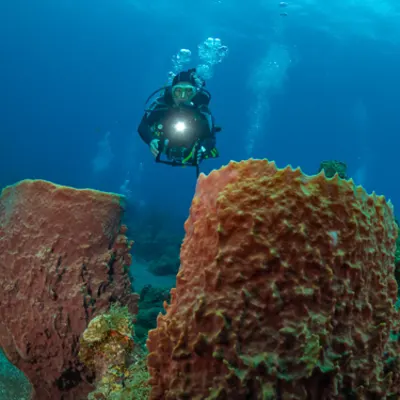
Scuba diving in
Eastern CaribbeanDiving Highlights
- Spell-binding island scenery with palm-fringed beaches and crystalline waters
- The best shore diving in the Caribbean, perfect for independent exploration
- Go cetacean-spotting from Dominica, the Caribbean’s whale-watching capital
- Diverse range of dive experiences, from wrecks and whales to macro and more
The islands of the Lesser Antilles arch around the Caribbean Plate’s southeastern edge in a near perfect curve. Sweeping north to south, this island chain is made up of three distinct regions; the Leeward Islands, running from the British Virgin Islands to Guadeloupe; the Windward Islands from Dominica to Trinidad and Tobago; and the Leeward Antilles, or ABC Islands, of Aruba, Bonaire, and Curaçao. Together, these small and somewhat isolated destinations offer a huge variety of different cultures, coupled with contrasting colonial influences.
While many of these islands are unique in their individual characters, they all share one thing in common - plenty of world-class diving! The northern Leeward Islands are home to famous spots such as the British Virgin Islands’ submerged seamounts, the hulking wrecks of St Kitts and Nevis, and the protected Saba National Marine Park. But divers visiting the southern Windward Islands can discover why St Vincent is often referred to as a haven for macro-lovers, or explore Martinique’s underwater landscapes, and St Lucia’s stunning Soufriere Marine Reserve. And, finally, in the far southeast of this remarkable island chain, amongst the Leeward Antilles, lies some of the world’s best shore diving.
Destinations in Eastern Caribbean
Top Eastern Caribbean experiences

Discover the Caribbean’s best shore diving
Home to the best, and most extensive, shore diving in the Caribbean, Bonaire is a mecca for independent divers. And with easy car rental, drive-through dive centres, and clearly marked dive sites, self-guided underwater exploration simply couldn’t be easier.

Explore the Hilma Hooker wreck
Lying at a depth of 30-metres, the 72-metre Hilma Hooker harbours a shady past but a far more positive present. Huge purple, white, and red tube sponges decorate the winches and masts, while orange cup corals carpet the propeller, creating shelter for a variety of reef-dwellers.

Spot Statia’s iconic blue beads beneath the water
Within the waters of St Eustatius, divers can unearth a range of interesting artefacts, including age-old glassy blue tokens that were once used as currency on the island.

Dive picturesque pinnacles in protected waters
Encounter mahi-mahi, trevally, and both reef and nurse sharks at some of Saba’s most iconic pinnacles, including Man O’War Shoal, Diamond Rock, and the aptly named Shark Shoals.

Tick off numerous lesser-known wrecks
These three destinations each offer an unexpected concentration of diveable wrecks. And, while they may not be the region’s most famous dive sites, these shipwrecks offer plenty of underwater interest.

Immerse yourself in expansive marine parks
Each of these islands is enveloped by extensive marine park protections, guaranteeing incredible underwater experiences brimming with healthy reefs, abundant marine life, and interesting history.

Venture to the remote Horseshoe Reef
Due to its remote and precarious nature, few divers venture to this secluded reef system, but those that do are rewarded with kaleidoscopic mazes, tunnels, and outcrops where nurse sharks, rays, and turtles reside.

Discover some of the healthiest reefs in the Caribbean
Sitting close to deep nutrient-rich waters, St Lucia promises easy access to thriving coral reefs that are awash with kaleidoscopic colours and diverse marine life.

Swim alongside sperm whales
Dominica plays host to multiple cetacean species throughout the year, including a resident population of sperm whales – allowing visitors to swim alongside these incredible creatures throughout the year.

Explore some of the Caribbean’s best macro
Saint Vincent has been coined the “critter capital of the Caribbean”, offering some of the best macro diving experiences outside of the Coral Triangle.
Eastern Caribbean dive seasons
The Eastern Caribbean offers a typical tropical climate which can be divided into two main seasons. January through May is considered the dry season and is also when tourism peaks. The rest of the year is considered the wet season, as rain is more common, but prices and crowds are generally a little lower. Temperatures range between 20-30°C throughout the year, with minimal variation between seasons, and water temperatures tend to stick within the high 20s.
While the official hurricane season runs from June through October, the Eastern Caribbean lie below the typical hurricane belt, placing them at low risk. That said, high water temperatures can cause stronger winds and occasional storms.
















